Module 4 Rules and suggestions Unit 2 we must keep the camp clean.课件(无素材共49张PPT)
文档属性
| 名称 | Module 4 Rules and suggestions Unit 2 we must keep the camp clean.课件(无素材共49张PPT) | 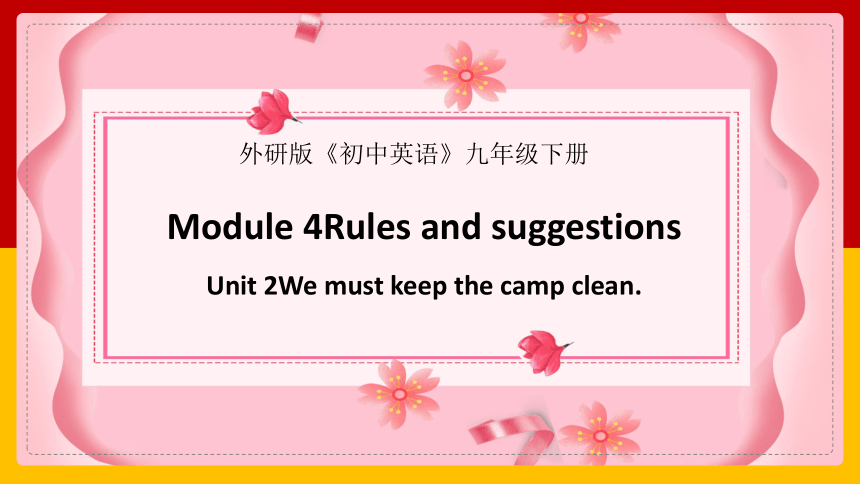 | |
| 格式 | pptx | ||
| 文件大小 | 3.4MB | ||
| 资源类型 | 教案 | ||
| 版本资源 | 外研版 | ||
| 科目 | 英语 | ||
| 更新时间 | 2021-08-30 08:31:01 | ||
图片预览

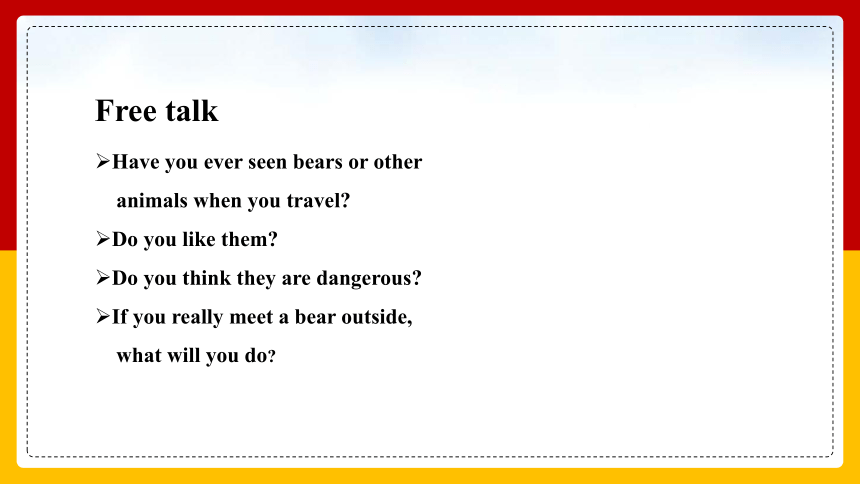
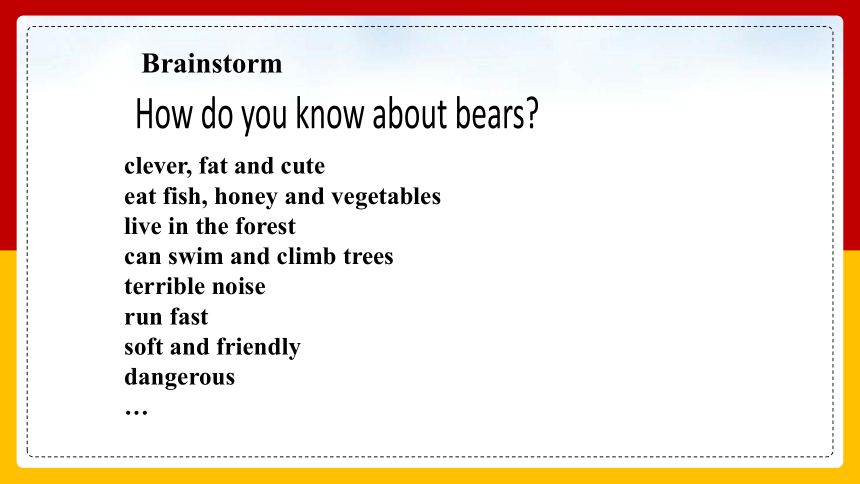
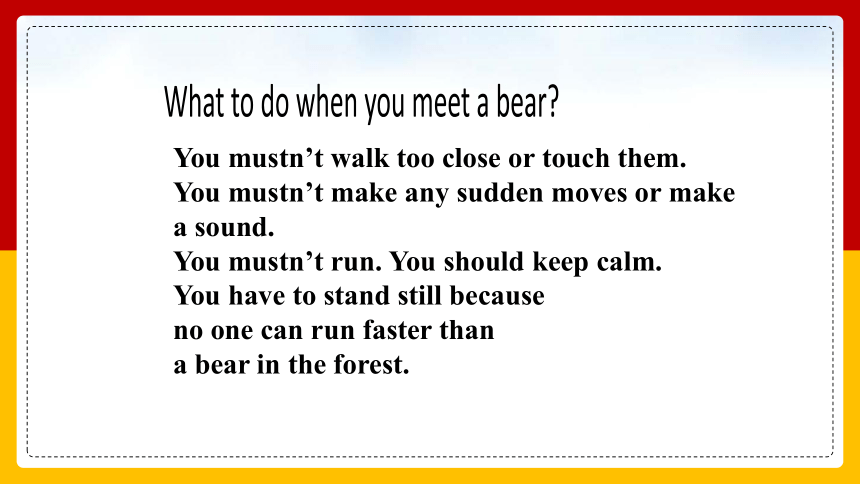
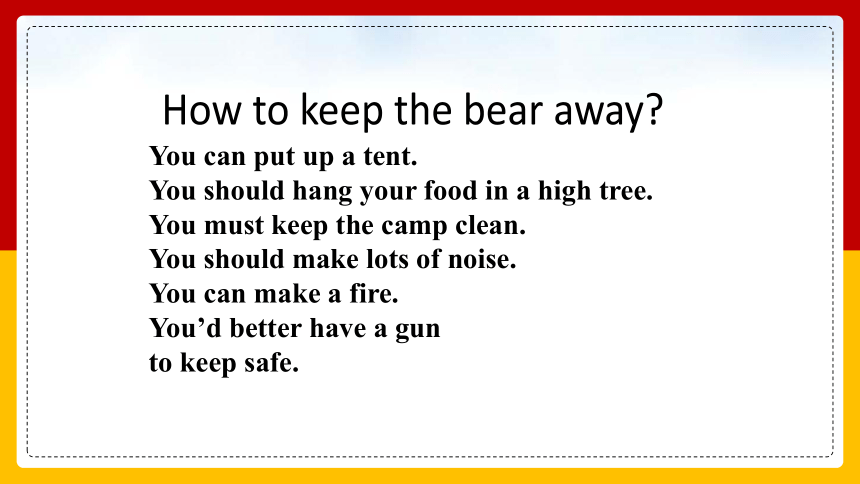
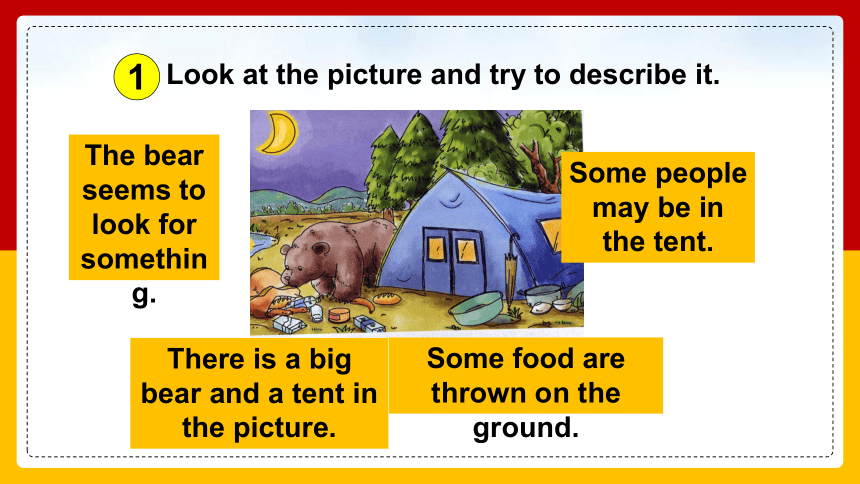
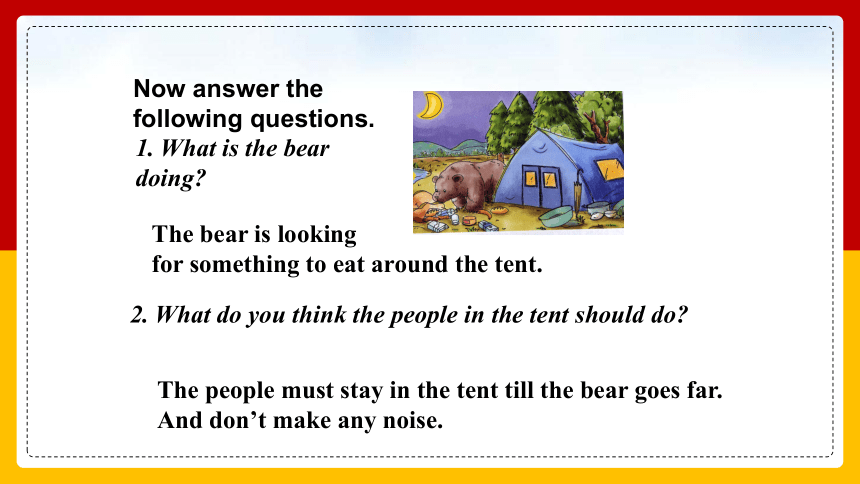
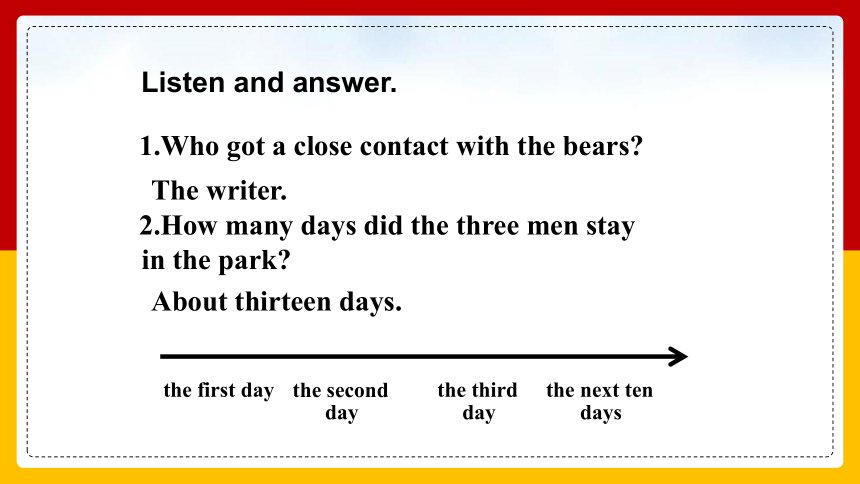
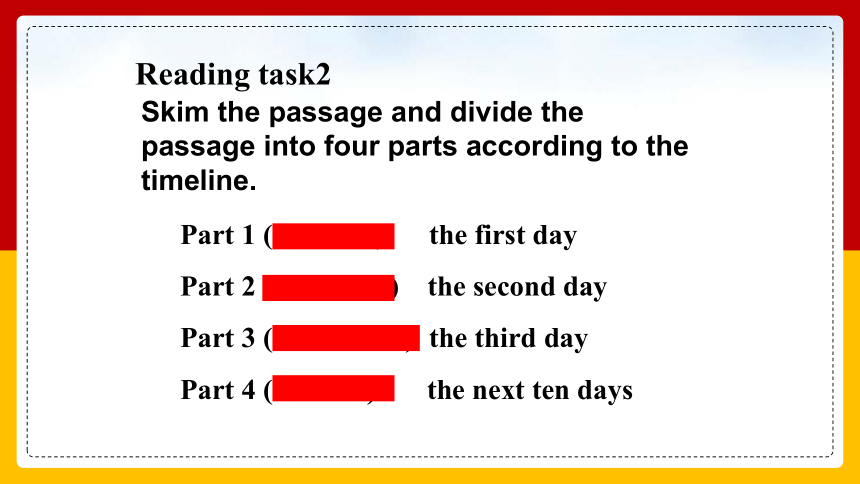
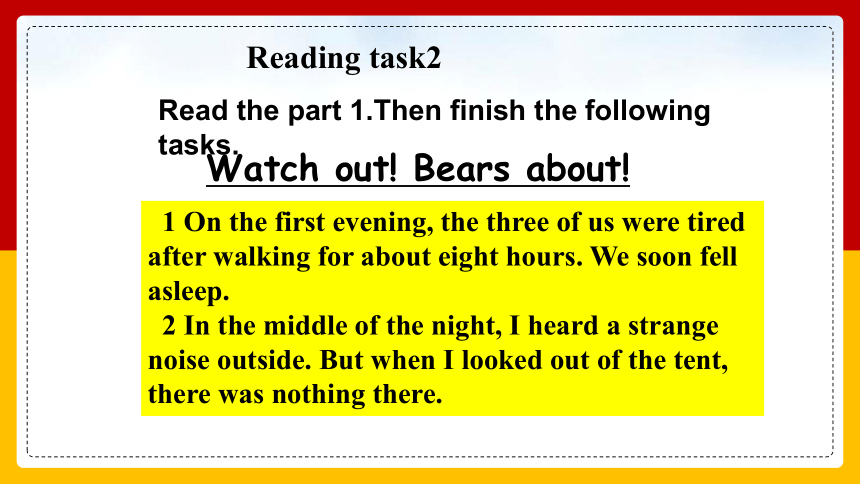
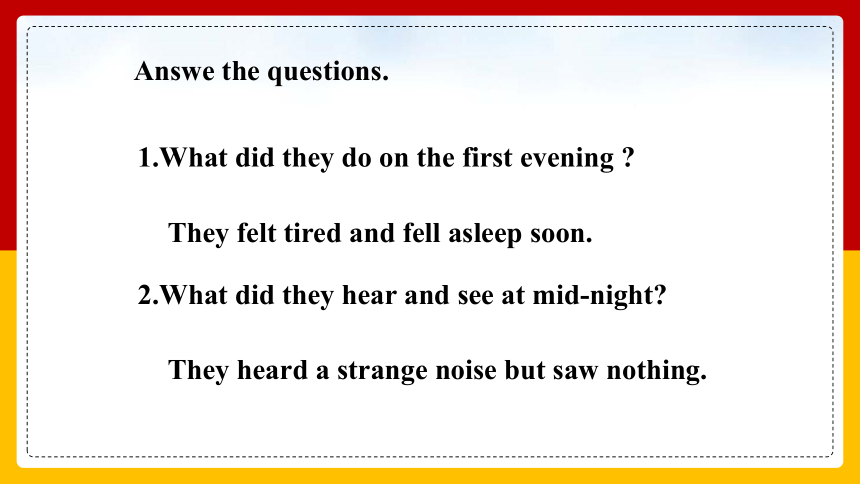
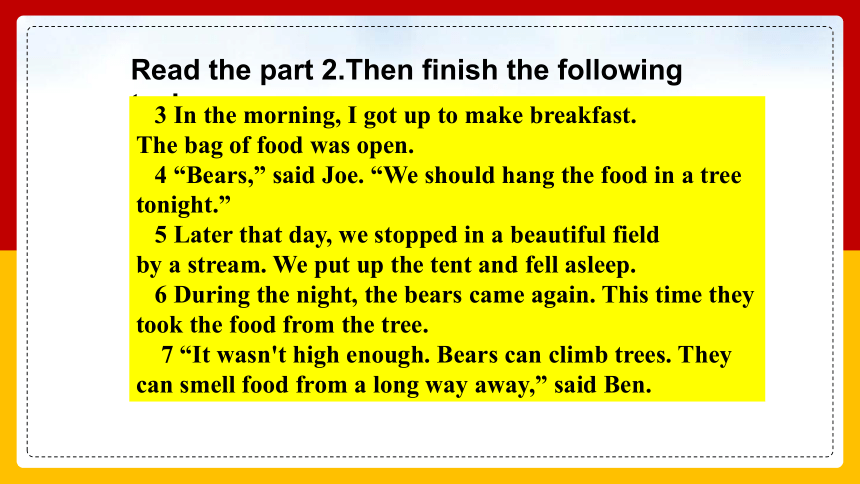
文档简介
(共49张PPT)
外研版《初中英语》九年级下册
Module
4Rules
and
suggestions
Unit
2We
must
keep
the
camp
clean.
Have
you
ever
seen
bears
or
other
animals
when
you
travel?
Do
you
like
them?
Do
you
think
they
are
dangerous?
If
you
really
meet
a
bear
outside,
what
will
you
do?
Free
talk
How
do
you
know
about
bears?
clever,
fat
and
cute
eat
fish,
honey
and
vegetables
live
in
the
forest
can
swim
and
climb
trees
terrible
noise
run
fast
soft
and
friendly
dangerous
…
Brainstorm
What
to
do
when
you
meet
a
bear?
You
mustn’t
walk
too
close
or
touch
them.
You
mustn’t
make
any
sudden
moves
or
make
a
sound.
You
mustn’t
run.
You
should
keep
calm.
You
have
to
stand
still
because
no
one
can
run
faster
than
a
bear
in
the
forest.
How
to
keep
the
bear
away?
You
can
put
up
a
tent.
You
should
hang
your
food
in
a
high
tree.
You
must
keep
the
camp
clean.
You
should
make
lots
of
noise.
You
can
make
a
fire.
You’d
better
have
a
gun
to
keep
safe.
Look
at
the
picture
and
try
to
describe
it.
1
There
is
a
big
bear
and
a
tent
in
the
picture.
The
bear
seems
to
look
for
something.
Some
people
may
be
in
the
tent.
Some
food
are
thrown
on
the
ground.
The
bear
is
looking
for
something
to
eat
around
the
tent.
Now
answer
the
following
questions.
1.
What
is
the
bear
doing?
2.
What
do
you
think
the
people
in
the
tent
should
do?
The
people
must
stay
in
the
tent
till
the
bear
goes
far.
And
don’t
make
any
noise.
Listen
and
answer.
1.Who
got
a
close
contact
with
the
bears?
2.How
many
days
did
the
three
men
stay
in
the
park?
The
writer.
About
thirteen
days.
the
third
day
the
next
ten
days
the
first
day
the
second
day
Part
1
(Para
1-2)
the
first
day
Part
2
(Para
3-11)
the
second
day
Part
3
(Para
13-17)
the
third
day
Part
4
(Para
18)
the
next
ten
days
Skim
the
passage
and
divide
the
passage
into
four
parts
according
to
the
timeline.
Reading
task2
Reading
task2
Read
the
part
1.Then
finish
the
following
tasks.
1
On
the
first
evening,
the
three
of
us
were
tired
after
walking
for
about
eight
hours.
We
soon
fell
asleep.
2
In
the
middle
of
the
night,
I
heard
a
strange
noise
outside.
But
when
I
looked
out
of
the
tent,
there
was
nothing
there.
Watch
out!
Bears
about!
Answe
the
questions.
1.What
did
they
do
on
the
first
evening
?
2.What
did
they
hear
and
see
at
mid-night?
They
felt
tired
and
fell
asleep
soon.
They
heard
a
strange
noise
but
saw
nothing.
Read
the
part
2.Then
finish
the
following
tasks.
3
In
the
morning,
I
got
up
to
make
breakfast.
The
bag
of
food
was
open.
4
“Bears,”
said
Joe.
“We
should
hang
the
food
in
a
tree
tonight.”
5
Later
that
day,
we
stopped
in
a
beautiful
field
by
a
stream.
We
put
up
the
tent
and
fell
asleep.
6
During
the
night,
the
bears
came
again.
This
time
they
took
the
food
from
the
tree.
7
“It
wasn't
high
enough.
Bears
can
climb
trees.
They
can
smell
food
from
a
long
way
away,”
said
Ben.
8
“We
must
keep
the
camp
clean,”
I
said.
“Bears
might
think
our
rubbish
is
food.”
9
“OK,
let’s
tidy
up
and
move
on.
And
we
should
make
lots
of
noise
too.
If
they
know
where
we
are,
they
may
not
come
any
closer,”
said
Joe.
10
“But
if
you
see
a
bear,”
said
Ben.
“you
mustn’t
make
any
sudden
moves
or
make
a
sound.
And
above
all,
you
mustn’t
run.
No
one
can
run
faster
in
the
forest
than
a
bear.
And
remember,
we
don’t
have
a
gun
to
keep
us
safe!”
11
That
night,
we
went
to
sleep...
or
we
tried
to.
time
see
do
in
the
morning
later
that
day
during
the
night
The
bag
of
the
food
was
open
hang
the
food
in
the
tree
a
beautiful
field
by
a
stream
put
up
the
tent
and
fell
asleep
The
bears
came
again
and
took
the
food
from
the
tree.
tidy
up
and
move
on
Finish
the
tasks.
Answer
the
question:
How
much
did
the
three
men
know
about
bears?
Bears
can
climb
trees.
Bears
can
smell
food
from
a
long
way
away.
No
one
can
run
faster
in
the
forest
than
a
bear.
Reading
task2
Read
the
part
3.Then
finish
the
following
tasks.
12
The
next
day,
we
stopped
at
eleven
o’clock
for
a
break.
While
the
others
were
resting,
I
went
for
a
walk
in
the
forest.
13
Suddenly,
I
saw
a
baby
bear
playing
with
some
sticks
and
stones.
He
looked
so
soft
and
friendly,
and
I
remember
thinking,
“If
I
reach
out,
I
can
just
touch
him.”
14
There
was
a
loud
noise
behind
me.
15
I
stood
very
still.
I
didn’t
even
turn
my
head.
There
was
another
loud
noise.
The
baby
bear
looked
up,
and
ran
towards
me.
I
turned
pale
and
he
ran
past
me
into
the
woods.
16
I
was
still
for
a
few
minutes.
Then
slowly
I
turned
round,
and
I
saw
the
baby
bear
and
his
huge
mother
walking
away.
17
I
ran
back
to
my
friends.
I
have
never
run
so
fast.
1.
The
writer
didn’t
like
the
baby
bear
at
all.
2.
The
writer
ran
away
quickly
after
hearing
a
loud
noise.
3.
The
baby
bear
ran
away
because
it
was
afraid
of
the
noise.
4.
The
mother
bear
loved
the
baby
bear.
(Use
“can
/
can’t
/
should
/
shouldn’t
/
must
/
mustn’t”)
Answe
the
question.
Q:What
should
you
do
if
there
are
bears
about?
You
should
hang
the
food
in
a
tree.
2.
You
must
keep
a
clean
camp
site.
3.
You
should
pick
up
your
rubbish.
4.
You
can
make
a
lot
of
noise.
5.
If
you
see
a
bear
you
mustn’t
run
away.
Read
the
part
4.Then
finish
the
following
tasks.
18
For
the
next
ten
days,
every
time
there
was
a
sudden
noise,
my
blood
went
cold.
The
writer’s
blood
went
cold
because
he
___.
a)
thought
the
mother
bear
was
coming
back
b)
was
afraid
of
noise
c)
liked
bears
d)
felt
ill
after
running
so
fast
A
Video
time
Let's
watch
the
video.
Private
Sub
ShockwaveFlash1_OnReadyStateChange(ByVal
newState
As
Long)
End
Sub
1.
Where
do
you
think
is
the
best
place
to
keep
food
safe
from
bears?
2.
What
was
the
noise
behind
the
writer?
3.
Do
you
think
their
camping
trip
was
interesting?
Read
the
passage
and
answer
the
questions.
I
think
the
best
place
is
in
a
high
tree.
It
was
a
mother
bear.
No,
I
don’t
think
so.
They
have
to
think
about
the
bear
during
the
trip.
2
What
happened
What
they
should
or
should
not
do
In
the
middle
of
the
first
night,
the
writer
heard
a
_____________
outside.
And
the
bag
of
food
___________.
They
should
____________________.
During
the
second
night,
the
bears
came
again
and
___________
from
the
tree.
They
should
_________________
and
________________.
strange
noise
was
open
hang
the
food
in
a
tree
took
the
food
keep
the
camp
clean
make
lots
of
noise
Complete
the
table.
3
What
happened
What
they
should
or
should
not
do
On
the
fourth
day,
the
writer
saw
__________
____________________
___________________.Then
_______________
_________
came.
He
should
not
____________________
_________________________________.
a
baby
bear
playing
with
some
sticks
and
stones
the
baby
bear’s
mother
make
any
sudden
moves,make
a
sound
or
go
for
a
walk
in
the
forest
1.
Watch
out!当心!
watch
out后接人或物作宾语时,需与介词for连用,构成watch
out
for
sb./sth.(=look
out
for
sb./sth.)结构,意为“小心/当心某人/某物”,为警示性用语;还可以表示“密切注意某人/某物”。
watch
out的同义短语为look
out或be
careful。
Watch
out!
There's
a
car
coming!
当心!有汽车来了!
Watch
out
for
pickpockets!小心扒手!
2.
…
the
three
of
us
were
tired
after
walking
for
about
eight
hours.步行了约八个小时之后,我们三个人都很累。
the
用在数词前,
表示特指。
the
three
of
us
指的是“我们三个人”
(一共就三个人);
three
of
us指的是“我们中的三个人”
(不止三个人)?
队里有八个人。他们八个今晚一起吃饭。
There
are
eight
people
in
the
team.
The
eight
of
them
will
have
dinner
together
tonight.
办公室有十个人,有八个是女的。
There
are
10
people
in
the
library
and
eight
of
them
are
women.
3.
We
soon
fell
asleep.
fall
asleep
意为“入睡;睡着”。表示动作,侧重于“自然而然地入睡”,有时指无意之中或在不适当的场合睡着。
My
father
fell
asleep
on
the
sofa.我爸爸在沙发上睡着了。
辨析:be
asleep;go
to
sleep;go
to
bed
一语辨异:I
went
to
bed
at
ten
last
night,
but
I
still
didn't
go
to
sleep/fall
asleep
at
twelve.
I
only
slept
5
hours.昨晚我10点上床睡觉,但12点我还没有睡着。我只睡了5个小时。
be
asleep意为“睡着的”,表示一种状态,可以和表示一段时间的状语连用。
The
child
has
been
asleep
for
two
hours.这个孩子已经睡了两个小时了。
go
to
sleep意为“睡着;入睡”,表示从清醒到渐渐睡着这一过程,强调进入睡眠状态。
He
always
goes
to
sleep
at
eleven
every
night.每天晚上他总是十一点钟入睡。
go
to
bed表示“上床睡觉”,强调上床睡觉这个动作,无“睡着”之意,它的对应词组是get
up“起床”。
We
went
to
bed
at
nine
and
fell
asleep
at
ten.
我们九点钟上床睡觉,十点钟入睡。
4.For
the
next
ten
days,
every
time
there
was
a
sudden
noise,
my
blood
went
cold.之后的十天中,每当听到突然的声响我都会心惊胆战。
every
time
在句中引导一个状语从句,
表示“每次……,
每当……”。
这里的go表示“处于(某种状态,
尤指令人生厌的状态)”,
其后可以接形容词,
如本句中的cold。
Every
time
I
go
and
see
him,
he’s
always
working
in
the
room.
每次我去看他,他总是在房间学习。
We’d
better
eat
these
apples
before
they
go
bad.
我们最好趁这些苹果还没坏,
把它们吃掉。
5.
We
should
hang
the
food
in
a
tree
tonight.
hang
v.
悬挂;吊.其过去式、过去分词均为hung。
My
coat
is
hanging
in
the
lab.
我的外套正在实验室里挂着。
词条
意义
过去式/过去分词
hang
悬挂;吊
hung;hung
绞死
hanged;hanged
eg:I
hung
the
washing
on
the
clothing
line.
我把洗好的衣服挂在晾衣绳上。
At
last,the
bad
man
was
hanged.
最后,这个坏男人被绞死了。
6.I
was
still
for
a
few
minutes.
still
adj.
静止的;不动的。still作副词使用时,含有“仍旧、还”之意,表示某事仍在继续。
辨析:still,
calm,
quiet这几个形容词的共同意思是“安静、平静、寂静”,其区别在于:
1.在修饰环境时各词所指的状态为:
calm指风平浪静;
quiet指没有吵闹干扰;
still指完全没有声音。
2.在修饰人时:
calm指人心平气和,毫不激动;
quiet指性情温和、安静等,有时也指人的闲散或不活动;
still指“一动不动”
。
选词填空:
calm,
quiet,
still
1)
Could
you
keep
the
kids
________
while
I’m
on
the
phone?
2)
He
was
still
______when
he
was
in
danger
3)
Keep
______
while
I
take
photos
of
you.
4)
Anna
is
______
enough
to
drive
a
car.
The
clock
struck
11
at
night
and
the
whole
house
was
______.
quiet
still
calm
calm
quiet
watch
out
小心
the
three
of
us
我们三个人
fall
asleep
入睡
put
up
挂起;张贴
tidy
up
整理
move
on
继续前进
look
out
of
向外看
above
all
最重要的是
reach
out
伸出(手或臂)
every
time
每次…
see
sb
doing
sth
看见某人正在做某事remember
doing
sth
记得做过某事
Find
key
phrases
and
solve
plete
the
passage
with
the
words
in
the
box.
4
On
the
third
day
of
our
camping
trip,
Ben
told
us
that
if
we
saw
a
bear,
we
should
not
make
any
(1)
_______moves.
We
did
not
have
a
(2)______to
keep
ourselves
safe.
The
next
day,
I
saw
a
baby
bear
playing
with
some
(3)______
and
stones.
His
mother
arrived
soon,
and
I
was
so
afraid
that
my
(4)_________went
cold.
I
did
not
move
until
the
bears
walked
away.
Then
I
ran
back
to
my
friends
as
fast
as
I
could.
blood
gun
sticks
sudden
sudden
gun
sticks
blood
1)
You
must
hang
the
food
high
in
a
tree.
What
should
(must)
you
do
if
there
are
bears
nearby
when
you
go
camping?
2)
…
must
/
should
pick
up
the
rubbish.
3)
…
must
/
should
keep
the
camp
clean.
4)
…
can’t
leave
anything
which
bears
might
think
is
food.
5)
…
should
make
a
lot
of
noise.
6)
…
mustn’t
move
or
make
a
sound.
7)
...
mustn’t
run
because
no
one
can
run
faster
in
the
forest
than
a
bear.
5
Think
of
an
area
of
countryside
nearby.
Answer
the
questions
and
make
notes.
You
can
use
reference
books
or
the
Internet
to
help
you.
Where
is
it?
Why
do
people
go
there?
Are
there
any
dangers
from
animals?
How
can
we
protect
ourselves?
What
should
we
do
to
look
after
the
place?
庐山,坐落于江西省北部,位于长江中游南岸,北接鄱阳湖,面积302平方公里,外围保护地带500平方公里,是集自然景观与人文景观于一体的旅游圣地。?
6
Write
sentences
with
the
notes
you
have
made
in
Activity
5.
Say
where
it
is.
Lushan
National
Park
is
in
Jiangxi
Province.
Say
why
people
go
there.
People
go
there
to
see
the
mountains
and
streams.
Say
if
there
are
any
dangers
from
animals.
The
fish
and
birds
there
are
not
dangerous,
but
there
are
some
snakes.
Say
how
we
can
protect
ourselves.
We
mustn’t
walk
in
the
grass.
Say
what
we
should
do
to
look
after
the
place.
We
should
allow
only
1,000
people
to
visit
it
each
day.
Write
a
passage
called
Look
after
the
countryside
and
yourself.
Use
the
sentences
you
have
written
in
Activity
6
to
help
you.
7
Suggestions
1.When
we
write
in
paragraphs,
we
should
choose
one
topic
for
each
paragraph
first.
2.Next,
We
can
write
notes
under
headings.
3.Finally,We
should
use
linking
words
(and,
but,
so,
because
etc.)
to
join
the
sentences
together.
21教育网
One
possible
version:
Lushan
National
Park
is
in
Jiangxi
Province.
Every
year,
many
tourists
visit
it
to
see
the
mountains,
valleys,
streams,
pools
and
waterfalls.
As
we
enjoy
the
lovely
birds
and
fish
in
the
park,we
must
also
be
careful
of
some
other
dangers,
such
as
snakes.
In
order
to
keep
ourselves
safe,
we
mustn’t
walk
in
the
grass.
I
think
we
should
allow
only
1,000
people
to
visit
it
each
day.
We
must
keep
it
clean
to
make
it
more
beautiful.
21教育网
本课时主要短语和句型
1.
the
three
of
us
2.
tidy
up
3.
reach
out
4.
And
we
should
make
lots
of
noise.
5.
If
you
see
a
bear,
you
mustn’t
make
any
sudden
moves
or
make
a
sound.
6.
I
saw
a
baby
bear
playing
with
some
sticks
and
stones.
及时小结才能巩固所学知识
Summary
外研版《初中英语》九年级
教学课件
非常感谢收看
外研版《初中英语》九年级下册
Module
4Rules
and
suggestions
Unit
2We
must
keep
the
camp
clean.
Have
you
ever
seen
bears
or
other
animals
when
you
travel?
Do
you
like
them?
Do
you
think
they
are
dangerous?
If
you
really
meet
a
bear
outside,
what
will
you
do?
Free
talk
How
do
you
know
about
bears?
clever,
fat
and
cute
eat
fish,
honey
and
vegetables
live
in
the
forest
can
swim
and
climb
trees
terrible
noise
run
fast
soft
and
friendly
dangerous
…
Brainstorm
What
to
do
when
you
meet
a
bear?
You
mustn’t
walk
too
close
or
touch
them.
You
mustn’t
make
any
sudden
moves
or
make
a
sound.
You
mustn’t
run.
You
should
keep
calm.
You
have
to
stand
still
because
no
one
can
run
faster
than
a
bear
in
the
forest.
How
to
keep
the
bear
away?
You
can
put
up
a
tent.
You
should
hang
your
food
in
a
high
tree.
You
must
keep
the
camp
clean.
You
should
make
lots
of
noise.
You
can
make
a
fire.
You’d
better
have
a
gun
to
keep
safe.
Look
at
the
picture
and
try
to
describe
it.
1
There
is
a
big
bear
and
a
tent
in
the
picture.
The
bear
seems
to
look
for
something.
Some
people
may
be
in
the
tent.
Some
food
are
thrown
on
the
ground.
The
bear
is
looking
for
something
to
eat
around
the
tent.
Now
answer
the
following
questions.
1.
What
is
the
bear
doing?
2.
What
do
you
think
the
people
in
the
tent
should
do?
The
people
must
stay
in
the
tent
till
the
bear
goes
far.
And
don’t
make
any
noise.
Listen
and
answer.
1.Who
got
a
close
contact
with
the
bears?
2.How
many
days
did
the
three
men
stay
in
the
park?
The
writer.
About
thirteen
days.
the
third
day
the
next
ten
days
the
first
day
the
second
day
Part
1
(Para
1-2)
the
first
day
Part
2
(Para
3-11)
the
second
day
Part
3
(Para
13-17)
the
third
day
Part
4
(Para
18)
the
next
ten
days
Skim
the
passage
and
divide
the
passage
into
four
parts
according
to
the
timeline.
Reading
task2
Reading
task2
Read
the
part
1.Then
finish
the
following
tasks.
1
On
the
first
evening,
the
three
of
us
were
tired
after
walking
for
about
eight
hours.
We
soon
fell
asleep.
2
In
the
middle
of
the
night,
I
heard
a
strange
noise
outside.
But
when
I
looked
out
of
the
tent,
there
was
nothing
there.
Watch
out!
Bears
about!
Answe
the
questions.
1.What
did
they
do
on
the
first
evening
?
2.What
did
they
hear
and
see
at
mid-night?
They
felt
tired
and
fell
asleep
soon.
They
heard
a
strange
noise
but
saw
nothing.
Read
the
part
2.Then
finish
the
following
tasks.
3
In
the
morning,
I
got
up
to
make
breakfast.
The
bag
of
food
was
open.
4
“Bears,”
said
Joe.
“We
should
hang
the
food
in
a
tree
tonight.”
5
Later
that
day,
we
stopped
in
a
beautiful
field
by
a
stream.
We
put
up
the
tent
and
fell
asleep.
6
During
the
night,
the
bears
came
again.
This
time
they
took
the
food
from
the
tree.
7
“It
wasn't
high
enough.
Bears
can
climb
trees.
They
can
smell
food
from
a
long
way
away,”
said
Ben.
8
“We
must
keep
the
camp
clean,”
I
said.
“Bears
might
think
our
rubbish
is
food.”
9
“OK,
let’s
tidy
up
and
move
on.
And
we
should
make
lots
of
noise
too.
If
they
know
where
we
are,
they
may
not
come
any
closer,”
said
Joe.
10
“But
if
you
see
a
bear,”
said
Ben.
“you
mustn’t
make
any
sudden
moves
or
make
a
sound.
And
above
all,
you
mustn’t
run.
No
one
can
run
faster
in
the
forest
than
a
bear.
And
remember,
we
don’t
have
a
gun
to
keep
us
safe!”
11
That
night,
we
went
to
sleep...
or
we
tried
to.
time
see
do
in
the
morning
later
that
day
during
the
night
The
bag
of
the
food
was
open
hang
the
food
in
the
tree
a
beautiful
field
by
a
stream
put
up
the
tent
and
fell
asleep
The
bears
came
again
and
took
the
food
from
the
tree.
tidy
up
and
move
on
Finish
the
tasks.
Answer
the
question:
How
much
did
the
three
men
know
about
bears?
Bears
can
climb
trees.
Bears
can
smell
food
from
a
long
way
away.
No
one
can
run
faster
in
the
forest
than
a
bear.
Reading
task2
Read
the
part
3.Then
finish
the
following
tasks.
12
The
next
day,
we
stopped
at
eleven
o’clock
for
a
break.
While
the
others
were
resting,
I
went
for
a
walk
in
the
forest.
13
Suddenly,
I
saw
a
baby
bear
playing
with
some
sticks
and
stones.
He
looked
so
soft
and
friendly,
and
I
remember
thinking,
“If
I
reach
out,
I
can
just
touch
him.”
14
There
was
a
loud
noise
behind
me.
15
I
stood
very
still.
I
didn’t
even
turn
my
head.
There
was
another
loud
noise.
The
baby
bear
looked
up,
and
ran
towards
me.
I
turned
pale
and
he
ran
past
me
into
the
woods.
16
I
was
still
for
a
few
minutes.
Then
slowly
I
turned
round,
and
I
saw
the
baby
bear
and
his
huge
mother
walking
away.
17
I
ran
back
to
my
friends.
I
have
never
run
so
fast.
1.
The
writer
didn’t
like
the
baby
bear
at
all.
2.
The
writer
ran
away
quickly
after
hearing
a
loud
noise.
3.
The
baby
bear
ran
away
because
it
was
afraid
of
the
noise.
4.
The
mother
bear
loved
the
baby
bear.
(Use
“can
/
can’t
/
should
/
shouldn’t
/
must
/
mustn’t”)
Answe
the
question.
Q:What
should
you
do
if
there
are
bears
about?
You
should
hang
the
food
in
a
tree.
2.
You
must
keep
a
clean
camp
site.
3.
You
should
pick
up
your
rubbish.
4.
You
can
make
a
lot
of
noise.
5.
If
you
see
a
bear
you
mustn’t
run
away.
Read
the
part
4.Then
finish
the
following
tasks.
18
For
the
next
ten
days,
every
time
there
was
a
sudden
noise,
my
blood
went
cold.
The
writer’s
blood
went
cold
because
he
___.
a)
thought
the
mother
bear
was
coming
back
b)
was
afraid
of
noise
c)
liked
bears
d)
felt
ill
after
running
so
fast
A
Video
time
Let's
watch
the
video.
Private
Sub
ShockwaveFlash1_OnReadyStateChange(ByVal
newState
As
Long)
End
Sub
1.
Where
do
you
think
is
the
best
place
to
keep
food
safe
from
bears?
2.
What
was
the
noise
behind
the
writer?
3.
Do
you
think
their
camping
trip
was
interesting?
Read
the
passage
and
answer
the
questions.
I
think
the
best
place
is
in
a
high
tree.
It
was
a
mother
bear.
No,
I
don’t
think
so.
They
have
to
think
about
the
bear
during
the
trip.
2
What
happened
What
they
should
or
should
not
do
In
the
middle
of
the
first
night,
the
writer
heard
a
_____________
outside.
And
the
bag
of
food
___________.
They
should
____________________.
During
the
second
night,
the
bears
came
again
and
___________
from
the
tree.
They
should
_________________
and
________________.
strange
noise
was
open
hang
the
food
in
a
tree
took
the
food
keep
the
camp
clean
make
lots
of
noise
Complete
the
table.
3
What
happened
What
they
should
or
should
not
do
On
the
fourth
day,
the
writer
saw
__________
____________________
___________________.Then
_______________
_________
came.
He
should
not
____________________
_________________________________.
a
baby
bear
playing
with
some
sticks
and
stones
the
baby
bear’s
mother
make
any
sudden
moves,make
a
sound
or
go
for
a
walk
in
the
forest
1.
Watch
out!当心!
watch
out后接人或物作宾语时,需与介词for连用,构成watch
out
for
sb./sth.(=look
out
for
sb./sth.)结构,意为“小心/当心某人/某物”,为警示性用语;还可以表示“密切注意某人/某物”。
watch
out的同义短语为look
out或be
careful。
Watch
out!
There's
a
car
coming!
当心!有汽车来了!
Watch
out
for
pickpockets!小心扒手!
2.
…
the
three
of
us
were
tired
after
walking
for
about
eight
hours.步行了约八个小时之后,我们三个人都很累。
the
用在数词前,
表示特指。
the
three
of
us
指的是“我们三个人”
(一共就三个人);
three
of
us指的是“我们中的三个人”
(不止三个人)?
队里有八个人。他们八个今晚一起吃饭。
There
are
eight
people
in
the
team.
The
eight
of
them
will
have
dinner
together
tonight.
办公室有十个人,有八个是女的。
There
are
10
people
in
the
library
and
eight
of
them
are
women.
3.
We
soon
fell
asleep.
fall
asleep
意为“入睡;睡着”。表示动作,侧重于“自然而然地入睡”,有时指无意之中或在不适当的场合睡着。
My
father
fell
asleep
on
the
sofa.我爸爸在沙发上睡着了。
辨析:be
asleep;go
to
sleep;go
to
bed
一语辨异:I
went
to
bed
at
ten
last
night,
but
I
still
didn't
go
to
sleep/fall
asleep
at
twelve.
I
only
slept
5
hours.昨晚我10点上床睡觉,但12点我还没有睡着。我只睡了5个小时。
be
asleep意为“睡着的”,表示一种状态,可以和表示一段时间的状语连用。
The
child
has
been
asleep
for
two
hours.这个孩子已经睡了两个小时了。
go
to
sleep意为“睡着;入睡”,表示从清醒到渐渐睡着这一过程,强调进入睡眠状态。
He
always
goes
to
sleep
at
eleven
every
night.每天晚上他总是十一点钟入睡。
go
to
bed表示“上床睡觉”,强调上床睡觉这个动作,无“睡着”之意,它的对应词组是get
up“起床”。
We
went
to
bed
at
nine
and
fell
asleep
at
ten.
我们九点钟上床睡觉,十点钟入睡。
4.For
the
next
ten
days,
every
time
there
was
a
sudden
noise,
my
blood
went
cold.之后的十天中,每当听到突然的声响我都会心惊胆战。
every
time
在句中引导一个状语从句,
表示“每次……,
每当……”。
这里的go表示“处于(某种状态,
尤指令人生厌的状态)”,
其后可以接形容词,
如本句中的cold。
Every
time
I
go
and
see
him,
he’s
always
working
in
the
room.
每次我去看他,他总是在房间学习。
We’d
better
eat
these
apples
before
they
go
bad.
我们最好趁这些苹果还没坏,
把它们吃掉。
5.
We
should
hang
the
food
in
a
tree
tonight.
hang
v.
悬挂;吊.其过去式、过去分词均为hung。
My
coat
is
hanging
in
the
lab.
我的外套正在实验室里挂着。
词条
意义
过去式/过去分词
hang
悬挂;吊
hung;hung
绞死
hanged;hanged
eg:I
hung
the
washing
on
the
clothing
line.
我把洗好的衣服挂在晾衣绳上。
At
last,the
bad
man
was
hanged.
最后,这个坏男人被绞死了。
6.I
was
still
for
a
few
minutes.
still
adj.
静止的;不动的。still作副词使用时,含有“仍旧、还”之意,表示某事仍在继续。
辨析:still,
calm,
quiet这几个形容词的共同意思是“安静、平静、寂静”,其区别在于:
1.在修饰环境时各词所指的状态为:
calm指风平浪静;
quiet指没有吵闹干扰;
still指完全没有声音。
2.在修饰人时:
calm指人心平气和,毫不激动;
quiet指性情温和、安静等,有时也指人的闲散或不活动;
still指“一动不动”
。
选词填空:
calm,
quiet,
still
1)
Could
you
keep
the
kids
________
while
I’m
on
the
phone?
2)
He
was
still
______when
he
was
in
danger
3)
Keep
______
while
I
take
photos
of
you.
4)
Anna
is
______
enough
to
drive
a
car.
The
clock
struck
11
at
night
and
the
whole
house
was
______.
quiet
still
calm
calm
quiet
watch
out
小心
the
three
of
us
我们三个人
fall
asleep
入睡
put
up
挂起;张贴
tidy
up
整理
move
on
继续前进
look
out
of
向外看
above
all
最重要的是
reach
out
伸出(手或臂)
every
time
每次…
see
sb
doing
sth
看见某人正在做某事remember
doing
sth
记得做过某事
Find
key
phrases
and
solve
plete
the
passage
with
the
words
in
the
box.
4
On
the
third
day
of
our
camping
trip,
Ben
told
us
that
if
we
saw
a
bear,
we
should
not
make
any
(1)
_______moves.
We
did
not
have
a
(2)______to
keep
ourselves
safe.
The
next
day,
I
saw
a
baby
bear
playing
with
some
(3)______
and
stones.
His
mother
arrived
soon,
and
I
was
so
afraid
that
my
(4)_________went
cold.
I
did
not
move
until
the
bears
walked
away.
Then
I
ran
back
to
my
friends
as
fast
as
I
could.
blood
gun
sticks
sudden
sudden
gun
sticks
blood
1)
You
must
hang
the
food
high
in
a
tree.
What
should
(must)
you
do
if
there
are
bears
nearby
when
you
go
camping?
2)
…
must
/
should
pick
up
the
rubbish.
3)
…
must
/
should
keep
the
camp
clean.
4)
…
can’t
leave
anything
which
bears
might
think
is
food.
5)
…
should
make
a
lot
of
noise.
6)
…
mustn’t
move
or
make
a
sound.
7)
...
mustn’t
run
because
no
one
can
run
faster
in
the
forest
than
a
bear.
5
Think
of
an
area
of
countryside
nearby.
Answer
the
questions
and
make
notes.
You
can
use
reference
books
or
the
Internet
to
help
you.
Where
is
it?
Why
do
people
go
there?
Are
there
any
dangers
from
animals?
How
can
we
protect
ourselves?
What
should
we
do
to
look
after
the
place?
庐山,坐落于江西省北部,位于长江中游南岸,北接鄱阳湖,面积302平方公里,外围保护地带500平方公里,是集自然景观与人文景观于一体的旅游圣地。?
6
Write
sentences
with
the
notes
you
have
made
in
Activity
5.
Say
where
it
is.
Lushan
National
Park
is
in
Jiangxi
Province.
Say
why
people
go
there.
People
go
there
to
see
the
mountains
and
streams.
Say
if
there
are
any
dangers
from
animals.
The
fish
and
birds
there
are
not
dangerous,
but
there
are
some
snakes.
Say
how
we
can
protect
ourselves.
We
mustn’t
walk
in
the
grass.
Say
what
we
should
do
to
look
after
the
place.
We
should
allow
only
1,000
people
to
visit
it
each
day.
Write
a
passage
called
Look
after
the
countryside
and
yourself.
Use
the
sentences
you
have
written
in
Activity
6
to
help
you.
7
Suggestions
1.When
we
write
in
paragraphs,
we
should
choose
one
topic
for
each
paragraph
first.
2.Next,
We
can
write
notes
under
headings.
3.Finally,We
should
use
linking
words
(and,
but,
so,
because
etc.)
to
join
the
sentences
together.
21教育网
One
possible
version:
Lushan
National
Park
is
in
Jiangxi
Province.
Every
year,
many
tourists
visit
it
to
see
the
mountains,
valleys,
streams,
pools
and
waterfalls.
As
we
enjoy
the
lovely
birds
and
fish
in
the
park,we
must
also
be
careful
of
some
other
dangers,
such
as
snakes.
In
order
to
keep
ourselves
safe,
we
mustn’t
walk
in
the
grass.
I
think
we
should
allow
only
1,000
people
to
visit
it
each
day.
We
must
keep
it
clean
to
make
it
more
beautiful.
21教育网
本课时主要短语和句型
1.
the
three
of
us
2.
tidy
up
3.
reach
out
4.
And
we
should
make
lots
of
noise.
5.
If
you
see
a
bear,
you
mustn’t
make
any
sudden
moves
or
make
a
sound.
6.
I
saw
a
baby
bear
playing
with
some
sticks
and
stones.
及时小结才能巩固所学知识
Summary
外研版《初中英语》九年级
教学课件
非常感谢收看
同课章节目录
- Module 1 Travel
- Unit 1 We toured the city by bus and by taxi
- Unit 2 It's a long story.
- Unit 3 Language in use
- Module 2 Education
- Unit 1 They don't sit in rows.
- Unit 2 What do I like best about school?
- Unit 3 Language in use
- Module 3 Life now and then
- Unit 1 They sometimes work harder.
- Unit 2 I think life is better today.
- Unit 3 Language in use.
- Module 4 Rules and suggestions
- Unit 1 You must be careful of falling stones.
- Unit 2 we must keep the camp clean.
- Unit 3 Language in use.
- Revison A
- Module 5 Look after yourself
- Unit 1 We'd better get you to hospital.
- Unit 2 Get off the sofa!
- Unit 3 Language in use.
- Module 6 Eating togethe
- Unit 1 When is the school-leavers' party?
- Unit 2 Knives and forks are used for most Western
- Unit 3 Language in use
- Module 7 English for you and me
- Unit 1 Have you ever been to an English corner?
- Unit 2 We all own English.
- Unit 3 Language in use
- Module 8 My future life
- Unit 1 Here's to our friendship and the future
- Unit 2 I know that you will be better at maths.
- Unit 3 Language in use
- Revison B
